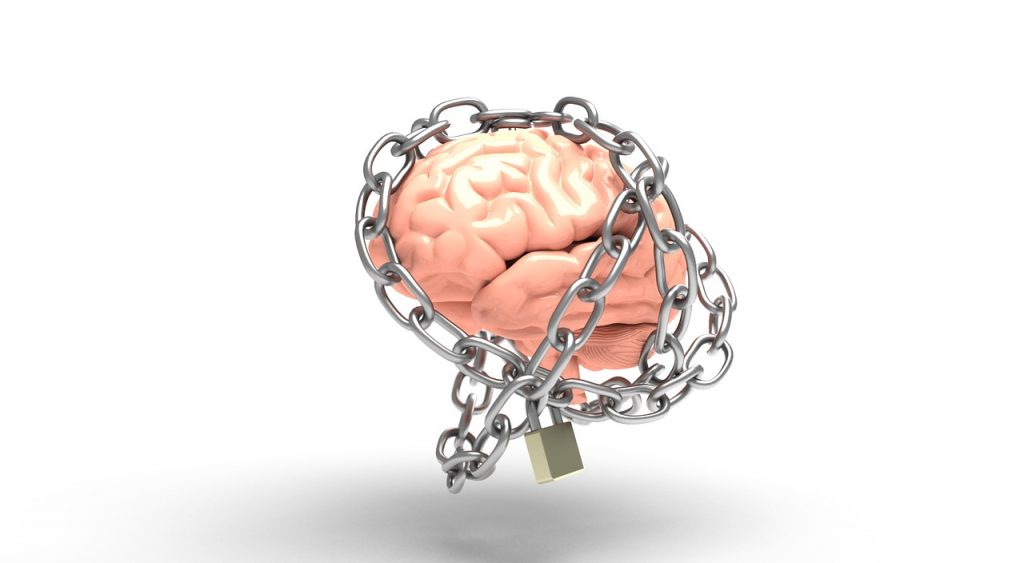Mental Health and Mental Illness are not the Same Thing

I have an issue. Okay, I have many issues but I’ll get to that later. I have a problem with how people use the terms mental health and mental illness interchangeably. And I am not the only one. There are a plethora of articles and forum entries about just this. And the reason is not that anyone wants to devalue the pain of those that are struggling, the reason is that if you use those terms interchangeably, then you devalue the struggles of those who actually suffer from serious mental illness. See, the same as poor physical health is not the same as physical illness, poor mental health is not the same as mental illness.
Let me start with saying that I am coming from quite a biased perspective. I am diagnosed with Dissociative Identity Disorder, Bipolar Disorder, Complex Post-Traumatic Stress Disorder and Generalized Anxiety Disorder. I am seriously mentally ill.
Mental Health vs. Mental Illness
The issue that I have with all of this is that an appropriation of terms, and with that resources, is happening. But first things first. Let us define things! Mental health is the state of your emotional and mental well-being. Just like with physical health, you can have good days and bad days. Sometimes you are sad, or you are stressed, or you are anxious. Some days you feel absolutely terrible, but other days, you are well.
The general mental health of people without mental illnesses is usually somewhere in the middle of the spectrum. No one is always happy, calm or satisfied. And it sucks. I am not devaluing the pain of bad days, or even bad circumstances. Everyone goes through break ups, the death of a loved one or other kinds of loss. And those things hurt. Bad. But they pass, and they can pass without any kind of intervention being needed.
Mental illness, on the other hand, is a diagnosed health condition. That means that you need to go to a doctor and what you are struggling with needs to fit the sets of symptoms of a mental illness. Examples of mental illnesses are: depression, anxiety disorders, trauma disorders, dissociative disorders, bipolar disorder, schizophrenia and personality disorders.
If the difference isn’t clear yer, let me try to explain it from a different angle. You have a headache that lasts for a few hours so you are frustrated, drink lots of water, take over the counter pain medication and go to bed early. The next day, you are better. You had a bad physical health day. And then there is your friend, who has constant migraines, missed work a lot and can’t get out of bed for weeks on end. She has a physical illness.
If you struggle with your mental health for a while, there are a lot of things that you can do on your own to make things better. You can do mindfulness, take care of your routines, talk to your friends, focus on self-care.
If you have mental illness, those things won’t sort your illness. You can do those things to maybe generally feel better, but they won’t cure your depression or anxiety disorder, they won’t magically make your schizophrenia disappear. If you have a mental illness, especially when it is a serious and chronic one, you need professional interventions and help. You need medications, therapy and maybe even hospitalizations. Your whole life is affected by your illness, so you can’t function anymore: you can’t work. you can’t socialize, you can’t take care of yourself.
Someone with mental illness can have good mental health days, and someone with a lot of bad mental health days, can develop a mental illness. But mental health and mental illness are not the same thing.
Mental Health = Mental Illness? – The Consequences
What happens when people assume that those two terms describe the same thing, is that they use terms out of the mental illness repertoire to describe a bad day. Saying things like “I am depressed” when you are really just sad or tired, or “I feel so bipolar” when you have had an emotionally unstable day, or “I went all psycho on him” when you really were just angry, is hurtful to those who are actually struggling with serious mental illness.
Another thing that happens is that people give unsolicited advice to those who are diagnosed with mental illness, even going so far as saying that taking medication is not necessary. Self-care and mindfulness can help improve everyone’s mental health, but they are not going to cure someone’s clinical depression or OCD. If you equal mental health and mental illness, you are continuing the stigma and misconceptions about mental illness and treatment.
I have talked about something similar before: I don’t feel like part of the #metoo movement because those that have actually been through sexual abuse, are being pushed into the shadows. It is about who the most priviledged people are, those who shout the loudest, those that have the resources, financially and socially, to spread their personal stories. So we hear loud stories about groping butts, but no women who used to be victims of human trafficking, or those who have been through complex sexual abuse during childhood.
Another area where it is really obvious that people confuse mental illness with mental health and common adversities, are trauma disorders. I volunteer in the area of mental illness and I also spend a lot of time in online groups on mental illness. And I have seen a very confusing trend. White privileged women yelling about their childhood abuse, toxic people and narcissists.
The thing is, when they then continue to tell their stories, then the “abuse” that they have been through is a mother that missed one of their birthdays because she was at the hospital at the time. The toxic people in their lives are the neighbours that play loud music at 10 PM, and the narcissist is the boss who sometimes has a bit of a powertrip. That is not what complex trauma is, this is not even what single trauma is. These women do not have a single symptom of mental illness. They are upset about small every day adversities.
Life sucks. Mothers can’t always be perfect. Your neighbours need a telling. And your boss is an idiot at times. But those things are not even in the same ballpark as someone who has mental illness. I don’t want to deny the “Karens” of this world support. Everyone deserves to get heard, validated and supported. But they have absolutely nothing to do in a group on mental illness. In general, I wouldn’t want to gatekeep, but what happens when those women scream the loudest is that those who actually need help with some serious shit, get pushed aside. They don’t know how to ask for help, they don’t know how to speak up. It is part of their illness that they can’ do those things, for fuck’s sake.
So, summarizing so far: Mental health and mental illness are not the same thing. But by assuming they are, people are not only appropriating terms falsely, they are also pushing aside those with actually illnesses.
But that is not all. The rise of raising awareness around mental health does not help those with mental illness. Why, you ask? Because they get pushed to the back of waiting lists for professional help. Karen doesn’t want to talk to a counselor or life coach. She has heard all about mental health now, someone gave her a flyer at Whole Foods. Karen wants to talk to a therapist with a PHD, and Karen can pay them lots of money. So Karen gets help. That is the simplified version.
In almost all Western countries, there hasn’t been a revision of the power of psychologists and psychiatrists. They govern themselves. That means that there are no rules that those who need help the most get helped first. And it isn’t always about money either. I mean. someone who goes into private practice will get the Karens and can make easy money just being an active listener. It is a bit of a waste of talent, and those who suffer from serious mental illness often can’t afford a private therapist because their illness, as we learned earlier, ruins their functionality and with that their ability to make big bucks. But my beef isn’t with capitalism. At least not this time, ha!
But did you know that therapists can actually choose their patients? There has been a huge debate about that in Germany as of late that I have been following with interest. Psychologists do not take on patients depending on need and severity of struggles, they can pick whoever they want. And naturally, we are all lazy human beans after all, they pick the easy cases. So yes, even in countries with free health care, those with mental illness get pushed to the back of the line, because they are ill, and that makes supporting them more difficult.
I actually experienced the confusing reality of this. After I had been released from the hospital after a suicide attempt, there was no help waiting for me. Instead, I was on a waiting list to see a therapist. I had to wait for six months. During those months I ended up hospitalized many times. My friend who was going through grief after the loss of her mother got to see a licensed therapist after waiting for two weeks! At the same psych center!
Assuming that mental health is the same as mental illness, washes out the severity of illness that holds risks of suicide. It also invalidates the struggles of those with illness. I wanted to talk about the difference between mental health and mental illness because we are talking about people’s lives here. I am not saying that someone who is going through adversities in life doesn’t deserve support. But I am saying that there is a spectrum of suffering, and those with mental illness need to be prioritized, at least when it comes to professional help. Because what kind of society are we living in if we push into the shadows those who are suffering from serious illnesses?











I know I forget the two are different. I am always second guessing myself when I write the prompts out for SB4MH. I think people are afraid of “mental illness” because that stigma is there. Mental Health sounds more positive, I guess. It is confusing for me at times because I am not a professional I have always been interested in how the mind works, what causes some to do this and not that. Why some do what they do. How to process bad events in our lives, that kind of stuff. I guess I understood mental health is how we take care of ourselves with or without the illness.
I’m glad you wrote this because I’m sure there are lots of folks out there who didn’t know there is a difference.
You made me laugh when you wrote about the “Karens” of the world. LOL
Happy Thoughts,
Cat
Mental health does sound more positive, and I am also not saying that mental health and mental illness don’t co-relate. Mental health is definitely something we can work on, and improve. It just like physical health, you know? But mental illness is different, just like physical illness is different.
I am just always worried that those who actually suffer from mental illness get pushed aside because they don’t have the loudest voices, If everyone would be more careful about which terms they use to describe what, then there would be a stage for those with mental illness again. Right now, Karen is dancing and singing her karaoke in the spotlight 😛
Thanks so much for reading and commenting <3
LOL.. your “Karen” comments are too funny cause I can actually see her and know those types!
Haha, we all know those types, I just gave them a collective name 😛
🤭😂
I needed to come back and read this again DS as you raise some really important points and make clear comparisons distinguishing between the two. I think I’m often guilty of using ‘mental health’ as a term for myself as I’m adverse to using ‘mental illness’ for myself, because shame.
In learning about my psychiatrist and psychologist diagnosed CPTSD I’ve seen it described as many things; a mental illness, an anxiety disorder, a trauma based mental health issue and a trauma injury amongst it all. I think that’s what I relate to most; I was injured by trauma, I have trauma injury. My mental health was repetitively and probably irreparably injured when I was young and all I can do now is manage it. Is it an illness? Maybe. Possibly. Probably.
I’m also acutely aware of not ‘fitting’ the atypical description of someone with a diagnosed mental illness. I’m not on medication, but did spend a decade on it, I’m not currently in therapy but have been in loads and may be again and I’m still working daily in a demanding profession successfully.
But my ability to be high functioning despite the CPTSD has complex reasons and it has been used to minimise my struggles inadvertently by friends, family, colleagues and even health professionals as I ‘look fine’ ‘seem fine’ and ‘am functioning’ fine to all intents and purposes. I could still be that and still be mentally unwell though. But am I ill ‘enough’? Not always in all eyes. Especially those who only look on the surface.
I can also relate to the waiting for help issues. My review appt I wrote about in Strong and Brave was postponed as they messed up and the psychologist I’ve seen was on annual leave. I waited 3 months for it and I’ve no idea how long I’ll now need to wait for a new one to be arranged for me, despite all my mental health questionnaires in June indicating severe depression and severe stress ( I graded them online!). Ugh.
A really thought provoking, awareness raising and vital post as always DS, and I thank you for writing it.
Thank you so much for your long, personal and thoughtful response, Kis! A few of the hallmarks of C-PTSD is the minimization of one’s own struggles. We try to not make it look so bad. I wonder if some of that is in what you said. In the end it is about how we feel something best describes our struggles. As you said, there is shame, there is also despair I assume, when it comes to accepting that something is an actual illness. We want to it to be an injury, something that leaves a scar and can heal, right? I can very much relate to that. But then, does one ever truly heal from trauma? Isn’t it a constant process that never stops, where we sometimes feel better and then have setbacks again because of triggers and vulnerabilities? We can have good mental health days, and then very bad mental health days which are impacted by our illness.
I want to mention that C-PTSD is now an officially recognized mental illness. It is in the newest ICD from the WHO. So if you have a certain set of symptoms, then you have the illness. Have you ever heard of Flight Type, the Obsessive Compulsive Type in C-PTSD? They are often very high functioning, despite their struggles, because they use being a busy bee to be able to not have to deal with their symptoms. I think those that are functioning while having mental illness are incredibly strong, but I also worry that there is going to be a stop for them, when they have burnt themselves out too much. I am very sorry to hear some people have invalidated your pain because you were still able to function.
For some it is important to acknowledge that they have an illness, so they can start validating their own pain. For others, the acceptance of an illness might lead to stronger despair. In the end it is important that how we call something, feel acceptable for us. Whatever we call it doesn’t take away the symptoms and struggles that come along with it. The important thing for me is that those who are struggling with mental illness, get prioritized by professionals. Calling everything mental health is making it more difficult for those who need it, to see therapists, psychiatrists or even get hospitalized when needed.
I’ll be honest and say this was a bit of a difficult read as it touched a couple of nerves (that probably needed touched) but I’ve come back to it and re-read your thoughtful response a few times. There are always new things to learn and be reminded of I think with such things. A lot to think about and process, but thanks for such an insightful reply. You got me good, and I totally agree from firsthand experience with the logistical issues surrounding the ‘catch all’ term of mental health. x
You know, I often want to make people think and reflect. Unfortunately that can also lead to making some feel uncomfortable. I like self-awareness though, and that is something that you are incredibly good at. And it seems like this has led to some self-awareness for you, and you found some areas that you still need to figure out for yourself, if and when you want to. So that can be a good thing!
I really enjoyed reading this DS. So much so that I second guessed my post about mental health day. Thankfully I really did write about my mental health and not my mental illness, as you have said there really is a definite difference. I can be as happy as a clam and having a great mental health day and wham out of nowhere I end up in a panic attack. We don’t get to control our mental illnesses, but we can control our mental health to an extent. I wish I could say I’m not going to have a panic attack today; I’m not going to avoid my family, friends and everyone in public. We don’t get to choose when our mental illness takes over. Period.
I wish I could take it all away for my son but I can’t do that either.
It is still very confusing and often convoluted when professionals use the terms interchangeably.
Thank you for sharing this and explaining the difference. ❤️
Thank you, J Lynn! I am glad to see that you can follow my thoughts on the topic. There isn’t anything healthy about mental illness, after all, and it is not something we can control. Just like with physical health, we can try to ease things with self-care and such, but it will not make the illness go away. A few days of self-care might improve a foul mood though.
<3
This is a good and timely reminder of the difference between mental health and mental illness. I found myself wary of considering recent depression and anxiety as a mental illness rather than mental health. I don’t know if that was personal stigma or simply that I hoped it was temporary with a solution. Perhaps I didn’t want to be a ‘Karen’.
That, btw, is a great description of how someone wanting attention can demand that attention and muscle out those who really need attention but find it so hard to ask for the help they need. And I totally agree with your associated point about #metoo.
I do think that there is an overwhelming misunderstanding that ‘good mental health’ equates to being happy. Happy is not the default human state. But in not being constantly happy people assume they are ill and demand remedies.
There’s a lot more I could comment on what is one of your usual excellent post. I may just leave it to a full post of my own.
Thank you for posting
melody xx
I think just as much as others invalidate and stigmatize those of us with mental illness, we also try to minimize our own pain. Accepting something as an illness and not just a fluke, a bad day or maybe a bad week, is very hard. I can so very much relate to that, I am very good at pushing away the reality of it all!
I don’t mind people getting attention for their troubles, I actually encourage people to talk about how they feel. But it shouldn’t be on the expense of others who do not have the power to demand the attention they actually deserve even more so because they are ill. It seems like society has difficulty finding the balance in all of this.
This was so well said: Happy is not the default human state. But people assume it is and get panicky when they don’t feel the happiness they are supposed to feel.
I am looking forward to reading that post! Thank you so much for your thoughtful comment, Melody!
This is a really informative article, and I hope I have never offended you when I wrote about my bad times. I don’t have a mental illness, but I do/did have problems with my mental health. I think I have always done it right on my blog, but feel free to point out if I haven’t because I would like to correct it.
Rebel xox
Thank you! I don’t think you I ever saw you use the term wrong at all. You often talk about your mental health and the adversities you go through, on a very human and relatable level!
YES. All I can say is YES. and PLEASE can everyone read this. In my daily life at university, so many people just say ‘I’m depressed’ when they’re just having a bad day. People complain and use terms and then want sympathy while disregarding that someone might struggle with a mental illness.
I think the consequences you point out are so important. Especially on the professional help front. The people that don’t *really* need that specialised help take up places for the ones that do. And both the people and the professionals (because of money) are a cause of this and it’s so frustrating and angering and unfair
I very much agree with what you are saying here. I think the issue is that mental illness has been washed down by it falsely being called mental health. It has become more mainstream, instead of it being about treatment and illness management, it seems to have become a movement that is all about mindfulness and self-care. All the mindfulness and self-care are not going to cure someone’s depression, bipolar disorder and PTSD. Hopefully more awareness will eventually to better differentiation of terms!
Yes exactly! And I think apart from how it helps people, which is great, it doesn’t help that those people then keep on suggesting these things over and over to people who struggle with a mental illness. Personally, it made me feel like it was my fault that I wasn’t getting better. But as this change came along, I’m sure another one will hopefully indeed bring along more awareness!